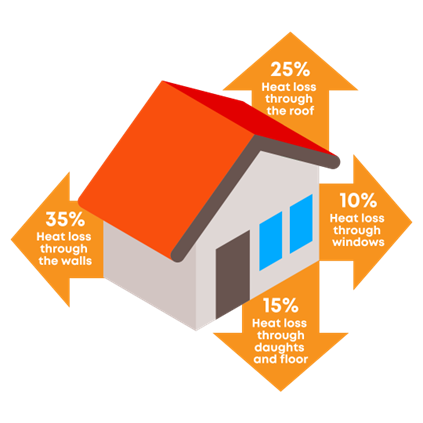Energy Saving Tips
- Turn off Standby Appliances: save an average of £40 per year by turning off appliances and unplugging chargers
- Install Thermostat: save around £75 per year by installing room thermostats, programmers and thermostatic radiator values
- Turn Down Your Thermostat: turning your heating down by just one degree could save up to £80 per year
- Buy Efficient Appliances: when it is time to swap your appliances go for one with a high energy efficiency rating which will use less electricity and save you money on your energy bills
- Wash Clothes at a Lower Temperature: washing clothes at 30 degrees rather than 40 degrees can help reduce your energy use and if you can cut out one wash cycle per week you can reduce £5 off your annual energy bill
- Lighting: turn off unnecessary lights. Make sure that everyone turns off every light when leaving a room and you can save up to £15 per year. Think about changing any inefficient light bulbs that you might have. You can save £3 per year for every traditional halogen bulb you switch to a similarly bright LED bulb.
- Curtains: close curtains at night to stop the heat from escaping through windows
- Kettle: only boil as much water as you need rather than fill the kettle at the start of the day. This small trick can save around £8 per year
- Cooking: put lids on when cooking
- Oven: high settings do not heat the over quicker so always set the oven temperature to what you need
- Water: use the plug in the sink and save water
- Showers: spend 1 minute less in the shower every day and save up to £7 per person on your energy bills. Use a water-efficient showerhead and a household of 4 people could save an extra £70 a year on heating costs plus £115 a year on water bills if on a water meter
- Buy energy-efficient appliances: if you are looking for a new appliance for your home look at the energy label which tells you how much energy the appliance uses and compare it. Appliances are tested for how much energy they use during typical use and are given a rating on a scale of A to G. A is the most efficient and G is the least efficient
- Fit reflective panels behind radiators: insulating behind radiators on uninsulated outside walls will reduce the amount of heat lost
- Chimney balloon: If you have, an open chimney that you do not use you can fit a removable chimney draught excluder for around £20. This could save you around £90 a year. Remember to remove the draught excluder from inside the chimney before you decide to light a fire
- Keep furniture away from radiators: donít block your radiator so move your sofa or furniture otherwise your heating system will have to work harder to heat the room
- Insulate your hot water tank: insulating the tank will keep the water hotter for longer and cost you less to heat the water up
Heat Loss
Nature loves everything to be in balance. This is true for heat which will always move from a hot area to a cold area until the areas are the same temperature. There are 4 ways that heat is lost from a property:
- Fabric Heat Loss: where heat escapes through the building materials such as walls
- Ventilation Heat Loss: where heat escapes as air blows through gaps
- Water heat loss: where heat is lost as hot water goes down the sink
- Flue heat loss: where heat is lost up chimneys and flues

25% heat loss through the roof
10% heat loss through windows
35% heat loss through the walls
15% heat loss through draughts and floor
How to find us
The service is based at our Centre for Independent Living (CIL), located on Beaufort Street, Warrington, WA51BA. You can also book in at our Energy Efficiency and Smart Flat located across from our CIL to see the energy consumption within your home and how implementing energy-saving and assistive measures could work within the home.
Contact Us
Contact a member of our team via telephone at 01925 240064, through our Warrington Disability Partnership Social media platforms (Facebook, Twitter, Instagram, LinkedIn), our online enquiry form or via email through our Energy Administrator on E.Houghton@disabilitypartnership.org.uk
SEE ALSO
Financial Help 2023/24Energy Saving Tips
Frequently Asked Questions
Smart Meters


